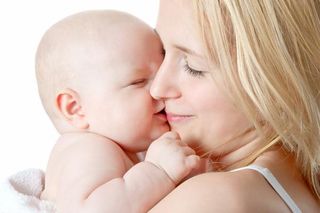Moms Gain Health Benefits From Breast-Feeding, Too

Breast-feeding not only delivers health benefits to babies, it also improves mothers' health.
The American Academy of Pediatrics reaffirmed its policy on breast-feeding today (Feb. 27), and in its statement, along with explaining the well-known benefits for babies of being breast-fed, the pediatricians' group also detailed the evidence for health benefits of breast-feeding for women.
"Both short- and long-term health benefits accrue to mothers who breast-feed," the policy statement said.
The benefits begin shortly after birth — women have less postpartum blood loss if they breast-feed. The uterus also shrinks back to its normal size more quickly in women who breast-feed, according to the statement.
A mother's mental health gets a boost from breast-feeding, too — a 2003 study from Australia showed an increase in postpartum depression in mothers who did not breast-feed, and those who weaned their babies early.
Breast-feeding has longer-term effects as well.
Research on the effects of breast-feeding on moms' abilities to return to their pre-pregnancy weight has been inconclusive because such studies tend to have many confounding factors, such as diet and activity levels. However, one study of more than 14,000 postpartum women who breast-fed exclusively for at least six months found they weighed less on average than those who didn't breast-feed.
Sign up for the Live Science daily newsletter now
Get the world’s most fascinating discoveries delivered straight to your inbox.
Among women who developed gestational diabetes, studies have found a 4 to 12 percent reduced risk of later developing Type 2 diabetes for each year a woman breast-feeds.
Women who breast-feed for at least 12 months over the course of their life reduce their risk of developing rheumatoid arthritis by 20 percent, and those who breast-feed for at least 24 months cut their risk of developing that condition in half, according to data from the large, long-term Nurses Health Study.
Heart disease and cancer
Another large, ongoing study, the Women's Health Study, showed how breast-feeding benefited women's hearts. That research, involving 139,000 women, found an 11 percent reduction in hypertension, a 19 percent reduction in having too-high levels of fat in the blood, and an overall 10 percent reduction in heart disease risk.
And women who cumulatively breast-feed for longer than a year have a 28 percent reduced risk of both breast cancer and ovarian cancer.
The AAP recommends that babies receive only breast milk until they are 6 months old, and then continue to receive breast milk, along with other foods, until they are at least 1 year old.
The doctors' group noted that there are cases where moms shouldn't breast-feed, such as when an infant has the metabolic disorder galactosemia, or when a mother has a certain disease, such as an active herpes infection or HIV, or is taking certain medications.
Pass it on: Breast-feeding may help women lose pregnancy weight, stave off postpartum depression, and lower long-term risks of heart disease and cancer.
This story was provided by MyHealthNewsDaily, a sister site to LiveScience. Follow MyHealthNewsDaily on Twitter @MyHealth_MHND. Find us on Facebook.

